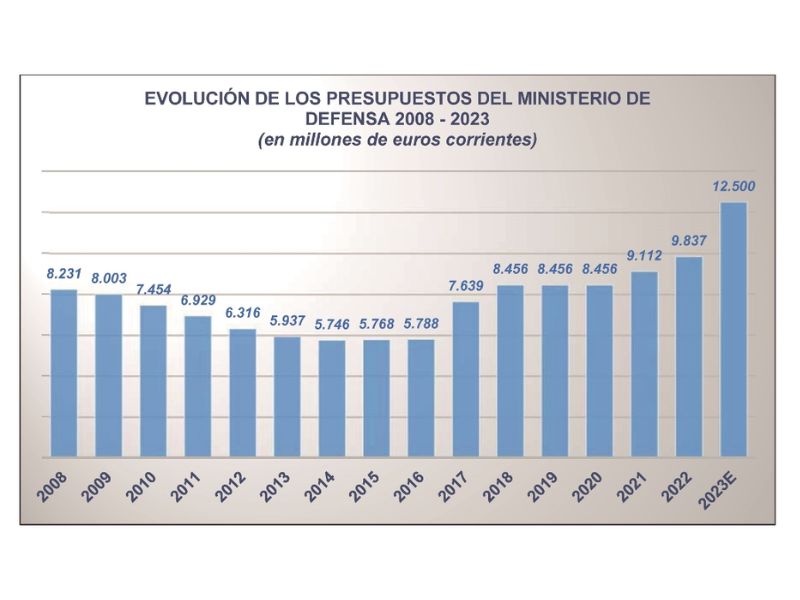(By the Director-General for Economic Affairs of the Ministry of Defence). The budgets of the Spanish Ministry of Defence have lacked predictability over the last 15 years, having gone from downward trends since 2008 to upward trends since 2016 in current terms.
Russia’s military invasion of Ukraine represents a dramatic shift in the world’s – and especially Europe’s – view of international security and threats. With the alteration of the status quo At the Madrid Summit in June 2022, NATO leaders approved a new Strategic Concept, which, among other things, calls on alliance members to equip themselves with the military means and resources to meet the new generation of threats.
Thus, the draft General Budget of the Spanish State for 2023 contemplates a historic increase with respect to the previous year, reaching a figure of 12.5 billion euros. This increase will be used to recover, maintain and improve the operational capabilities of the Armed Forces. The objectives of the Ministry of Defence, and thus of the budgets of Section 14, are directly linked to the fulfilment of the constitutional missions attributed to the Armed Forces.
Thus, in the 2023 budgets, the main items are personnel (Chapter 1), current expenditure (Chapter 2) and real investments (Chapter 6), making up 98 percent of the total budget. With regard to personnel expenses, the projected appropriations amount to 5,375 million euros, representing 44 per cent and experiencing an increase of 313.64 million, 6.2 per cent with respect to 2022, which will make it possible to pay the salaries of civilian and military personnel serving in the Ministry of Defence.
Chapter 2, which is devoted to expenditure on current goods and services, is the third largest item in the entire budget. 1,026.50 million, representing 8 percent, an increase of 12.92 percent over 2022. This growth is intended to meet the higher costs of increased force readiness, in order to improve the levels of instruction, training and readiness for new operational demands and increased activity.
Lastly, the item earmarked for real investments amounts to 5,868.93 million euros, which represents 48 percent of the total budget. This chapter accounts for most of the significant increase in the Defence Budget, rising to 2,221.61 million euros, 60.91 percent more than the figures approved for 2022. The aim of these appropriations is to improve the operational capability of the Armed Forces, while at the same time increasing Spain’s technological independence.

The immediate aim is to guarantee a credible deterrence and defence capability, reinforcing capabilities, improving the sustainment and replacement of existing equipment and systems, ammunition and spare parts levels and acquiring new weapons systems, with a clear focus on strengthening the production capacity of Spanish industry and our strategic sovereignty.
The industrial and technological base and commitment to the EU and NATO
The million-dollar investment envisaged in Spain’s future defence budgets will provide a significant boost to the industrial and technological base of defence, contributing to the generation of high-quality technological employment. The reinforcement of armaments and defence material programmes, as well as the boosting of R&D&I activities, will have a very positive impact on the Spanish defence industry.
This will consolidate ongoing special weapons programmes, including those aimed at obtaining new air superiority capabilities.Eurofighter and the future fighter aircraft), naval (frigates and F-110 and submarines S-80) and ground superiority in the battlefield (combat vehicles VCR 8×8). The growth path of the Ministry of Defence’s budgets is planned to reach 2 per cent of GDP (Gross Domestic Product).
The year 2029 will also see the launch of new major programmes, such as the modernisation of air defence systems. PatriotThe renewal of maritime patrol capabilities, the acquisition of the new model of self-propelled howitzer with chains and the complete renewal of the fleet of oceanic and coastal hydrographic vessels.
This draft budget clearly reflects Spain’s commitment to the agreements that the EU heads of state and government made in Versailles on 11 March this year on the effort to be devoted to defence, increased cooperation, recovery of capabilities, promotion of innovation and strengthening of industry. In line with the European commitment, the increase in these budgets is only the beginning of an upward path to reach the levels agreed within both the European Union and NATO, whose benchmark is 2 per cent of GDP. (Major General of the Air and Space Army Quartermaster Corps José Luis Sánchez Martínez. Director General of Economic Affairs of the Ministry of Defence)

